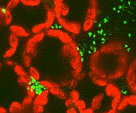Plant Pathology, Department of

Department of Plant Pathology: Faculty Publications
Document Type
Article
Date of this Version
1-10-2000
Abstract
A method for producing large numbers of transgenic wheat plants has been developed. With this approach, an average of 9.7% of immature embryo explants were transformed and generated multiple self-fertile, independently transformed plants. No untransformed plants, or escapes, were regenerated. This transformation procedure uses morphogenic calli derived from scutellum tissue of immature embryos of Triticum aestivum cv. Bobwhite co-bombarded with separate plasmids carrying a selectable marker gene (bar) and a gene of interest, respectively. Transformed wheat calli with a vigorous growth phenotype were obtained by extended culture on media containing 5.0 mg/l bialaphos. These calli retained morphogenic potential and were competent for plant regeneration for as long as 11 months. The bar gene and the gene of interest were co-expressed in T0 progeny plants. This wheat transformation protocol may facilitate quantitative production of multiple transgenic plants and significantly reduce the cost and labor otherwise required for screening out untransformed escapes.


Comments
Published in Plant Cell Reports (2000) 19: 241–250.